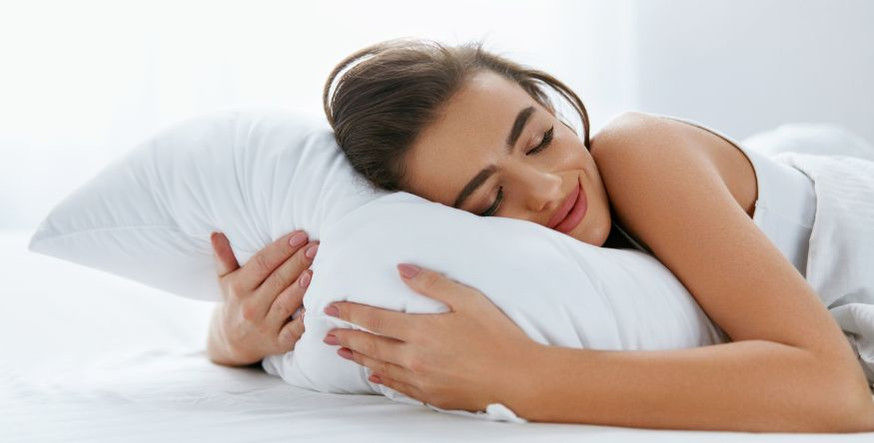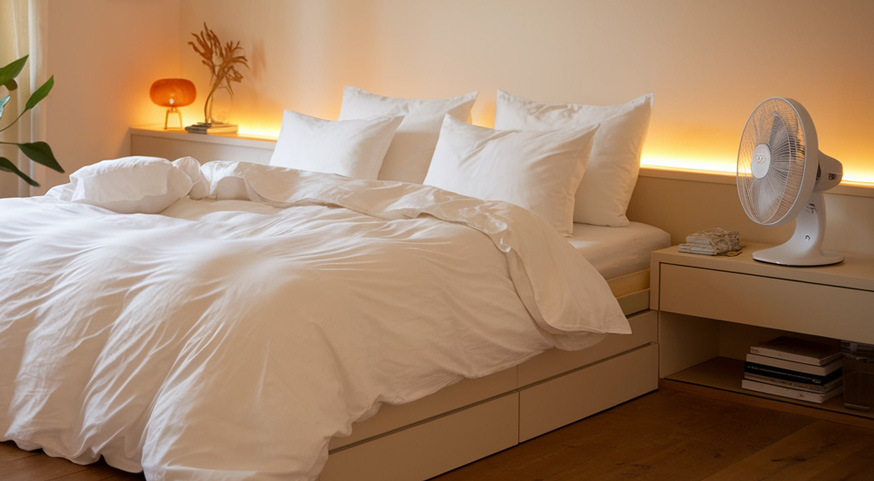Posted by Matt Cardoni on Apr 18, 2023
Choose the Best Sleep Position & Improve Your Posture | DOWNLITE Blog
Have you ever wondered why you spend most of the night sleeping in the position you do? Our bodies communicate with us in various ways, and our sleep position can significantly impact our health. The more we listen to what our bodies tell us, the sooner we can reduce the aches and pains that arise during sleep and improve our sleep posture to get better sleep.
According to studies by the Sleep Foundation, most children spend equal amounts of time in all three sleep positions; side, back, and stomach. However, as we age, most people spend more time on their sides. We'll review the most common sleeping positions and explain how to improve your sleep posture and sleep quality for each position.
Side Sleepers
There are a few reasons to sleep on your side – and several nuances to consider based on your health factors - to help determine which side you might want to prioritize in your sleeping habits based on your individual health needs:
- Since your stomach resides on the left side of your body, sleeping on your right side gives the stomach space to work while you sleep. Therefore it can be helpful for digestion to sleep on your right side.
- Your heart is also on the left side of your body, so sleeping on your right side can also benefit circulation.
- Conversely, sleeping on your left side can help promote the reduction of heartburn and acid reflux.
- Sleeping on either side can help support brain function and neurological health. Over 50 percent of people sleep on their sides.
- Side sleeping can help promote brain health with increased blood flow and reduce back pain by reducing the weight on your lower spine.
- Sleeping on either side can also support your airways staying open– which in turn lowers your chances of snoring – which, of course, can lead to improved chances of keeping a bedmate!
Back Sleepers
Sleeping on your back can provide benefits such as back pain reduction, acne reduction, and easier breathing. Some studies even cite back sleeping as a way to reduce wrinkles. While the science on that is shaky, some people find sleeping on their backs can alleviate various pressure points, resulting in better sleep quality overall. Here are some considerations to keep in mind when deciding whether to sleep on your back:
- Back sleeping can help reduce pressure on your spine. It would help if you used pillows under your lower legs to support your weight and maintain the natural curvature of the spine, thus reducing the pressure on your back.
- Back sleeping can support the reduction of acne and skin breakouts. Because pillowcases absorb oils and greases produced by the skin, they can also transfer this residue back to your face, resulting in increased acne and breakouts. Laying on your back prevents this from happening.
- Back sleeping can improve sinus drainage during sleep and result in improved breathing. Elevating your head above your heart is essential to keep drainage going in the right direction.
Stomach Sleepers
Many of the few adults who sleep on their stomachs fall into it to avoid snoring. As stated above, side sleeping can also attain the same result with far less damage to your spine. Unfortunately, stomach sleeping can cause considerable strain to the lower back and neck and is generally not recommended by professionals. But never fear dear stomach sleeper; there are solutions for those who continuously find themselves on their tummies, night after night. You don't need to take that painkiller with your morning coffee first thing.
How to Improve Your Sleep Posture
To wake up refreshed and ready to take on the world, keeping your spine aligned as you sleep is imperative. Your spine has a curvature; using pillows to support this natural curvature is an excellent way to give it the support it needs. Side sleepers benefit from a thick, firm pillow to keep the neck straight throughout the night. Back sleepers do best with a pillow with medium height and thickness to give support with moderate elevation. And stomach sleepers should use a soft, thin & flat pillow to maximize spinal alignment and minimum aches and pains.











